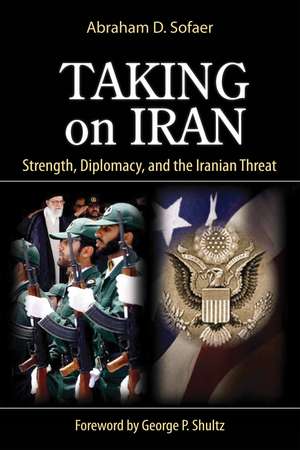Taking on Iran: Strength, Diplomacy, and the Iranian Threat
Autor Abraham D. Sofaeren Limba Engleză Hardback – 16 iul 2013
The threat posed by Iran to international peace and security is approaching a crisis. After compiling a thirty-year record as the world’s most active supporter of terrorism, Iran seems determined to develop nuclear weapons. In Taking on Iran, Abraham D. Sofaer argues that US policy toward Iran cannot be restricted to a strategy based on the two costly and potentially ineffective options of attacking Iran’s nuclear program or containing a nuclear-armed Iran. Economic sanctions and ineffective diplomacy have failed to convince Iran to abandon its nuclear arms ambitions. Sofaer explains that the United States should add to the pressure on Iran, going beyond economic sanctions and responding forcefully to Iranian Revolutionary Guard Corps (IRGC) aggression, increasing the likelihood that Iran will negotiate in earnest and enabling the United States to engage Iran in the disciplined manner required for success.
The author outlines thirty years of IRGC aggression and the corresponding thirty years of US weakness by both Republican and Democratic administrations. Drawing from experience in dealing with the Soviet Union during the Reagan administration, he demonstrates that combining strength and diplomacy is the option most likely to convince Iran to comply with international law without either the war necessary to end Iran’s nuclear program or the danger in attempting to contain Iran after it acquires nuclear weapons.
The author outlines thirty years of IRGC aggression and the corresponding thirty years of US weakness by both Republican and Democratic administrations. Drawing from experience in dealing with the Soviet Union during the Reagan administration, he demonstrates that combining strength and diplomacy is the option most likely to convince Iran to comply with international law without either the war necessary to end Iran’s nuclear program or the danger in attempting to contain Iran after it acquires nuclear weapons.
Preț: 144.91 lei
Preț vechi: 174.14 lei
-17% Nou
Puncte Express: 217
Preț estimativ în valută:
27.74€ • 30.14$ • 23.31£
27.74€ • 30.14$ • 23.31£
Carte indisponibilă temporar
Doresc să fiu notificat când acest titlu va fi disponibil:
Se trimite...
Preluare comenzi: 021 569.72.76
Specificații
ISBN-13: 9780817916343
ISBN-10: 0817916342
Pagini: 200
Dimensiuni: 152 x 229 x 25 mm
Greutate: 0.47 kg
Ediția:Updated Edition
Editura: Hoover Institution Press
Colecția Hoover Institution Press
ISBN-10: 0817916342
Pagini: 200
Dimensiuni: 152 x 229 x 25 mm
Greutate: 0.47 kg
Ediția:Updated Edition
Editura: Hoover Institution Press
Colecția Hoover Institution Press
Notă biografică
Abraham D. Sofaer, who served as legal adviser to the US Department of State from 1985 to 1990, was appointed the first George P. Shultz Distinguished Scholar and Senior Fellow at the Hoover Institution in 1994. During his service as legal adviser, he was responsible for US/Iran negotiations at the Iran/US Tribunal in The Hague.
Cuprins
Foreword by George P. Shultz vii
Acknowledgments xiii
Introduction 1
Chapter 1 Dealing with the Iranian Threat 5
Regime Change 7
Sanctions 9
Negotiations and Direct Appeals 13
Preventive Attack or Containment? 15
An Alternative to Preventive Attack and Containment 24
Chapter 2 Thirty Years of IRGC Aggression 27
Lebanon 29
Iraq 31
Afghanistan 33
Saudi Arabia 35
United States 36
Attacks on Other States 41
Interference with Navigational Rights 43
Chapter 3 Thirty Years of US Weakness 45
Jimmy Carter 47
Ronald Reagan 48
George H.W. Bush 54
William J. Clinton 60
George W. Bush 69
Barack Obama 78
Chapter 4 Defending Against IRGC Attacks 83
Legality of Defending Against IRGC Aggression 84
Legitimacy of Defensive Measures Against the IRGC 88
Covert Attacks 91 Balance of Consequences 92
Chapter 5 Beyond Strength: Effective Diplomacy 101
Rhetorical Restraint 101
Regime Engagement 105
Limited Linkage 110
A Broad Agenda 114
Forum Flexibility 116
Conclusion 119
Notes 125
About the Author 171
Index 173
Acknowledgments xiii
Introduction 1
Chapter 1 Dealing with the Iranian Threat 5
Regime Change 7
Sanctions 9
Negotiations and Direct Appeals 13
Preventive Attack or Containment? 15
An Alternative to Preventive Attack and Containment 24
Chapter 2 Thirty Years of IRGC Aggression 27
Lebanon 29
Iraq 31
Afghanistan 33
Saudi Arabia 35
United States 36
Attacks on Other States 41
Interference with Navigational Rights 43
Chapter 3 Thirty Years of US Weakness 45
Jimmy Carter 47
Ronald Reagan 48
George H.W. Bush 54
William J. Clinton 60
George W. Bush 69
Barack Obama 78
Chapter 4 Defending Against IRGC Attacks 83
Legality of Defending Against IRGC Aggression 84
Legitimacy of Defensive Measures Against the IRGC 88
Covert Attacks 91 Balance of Consequences 92
Chapter 5 Beyond Strength: Effective Diplomacy 101
Rhetorical Restraint 101
Regime Engagement 105
Limited Linkage 110
A Broad Agenda 114
Forum Flexibility 116
Conclusion 119
Notes 125
About the Author 171
Index 173
Descriere
Abraham D. Sofaer argues that US policy toward Iran cannot safely be restricted to a strategy that considers only the two high-risk, costly, and potentially infeasible options of a preventive attack on Iran’s nuclear facilities or containing a nuclear-armed Iran. Instead, the United States should respond forcefully to Iranian Revolutionary Guard Corps (IRGC) aggression, enhancing its credibility and increasing the likelihood that Iran will negotiate in earnest. The United States must also be prepared to engage Iran in a disciplined manner, avoiding disabling preconditions and adopting the negotiating practices used successfully by the United States when dealing with the Soviet Union during the 1980s.
